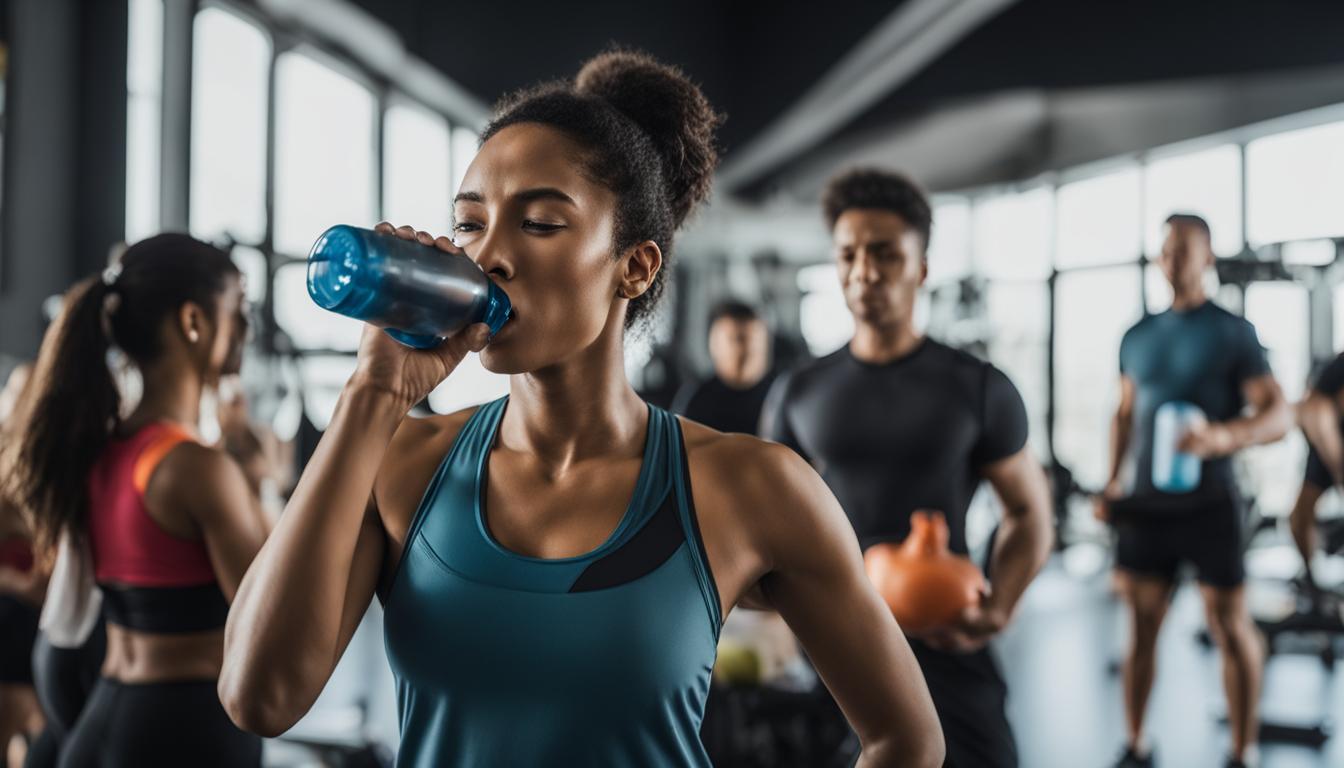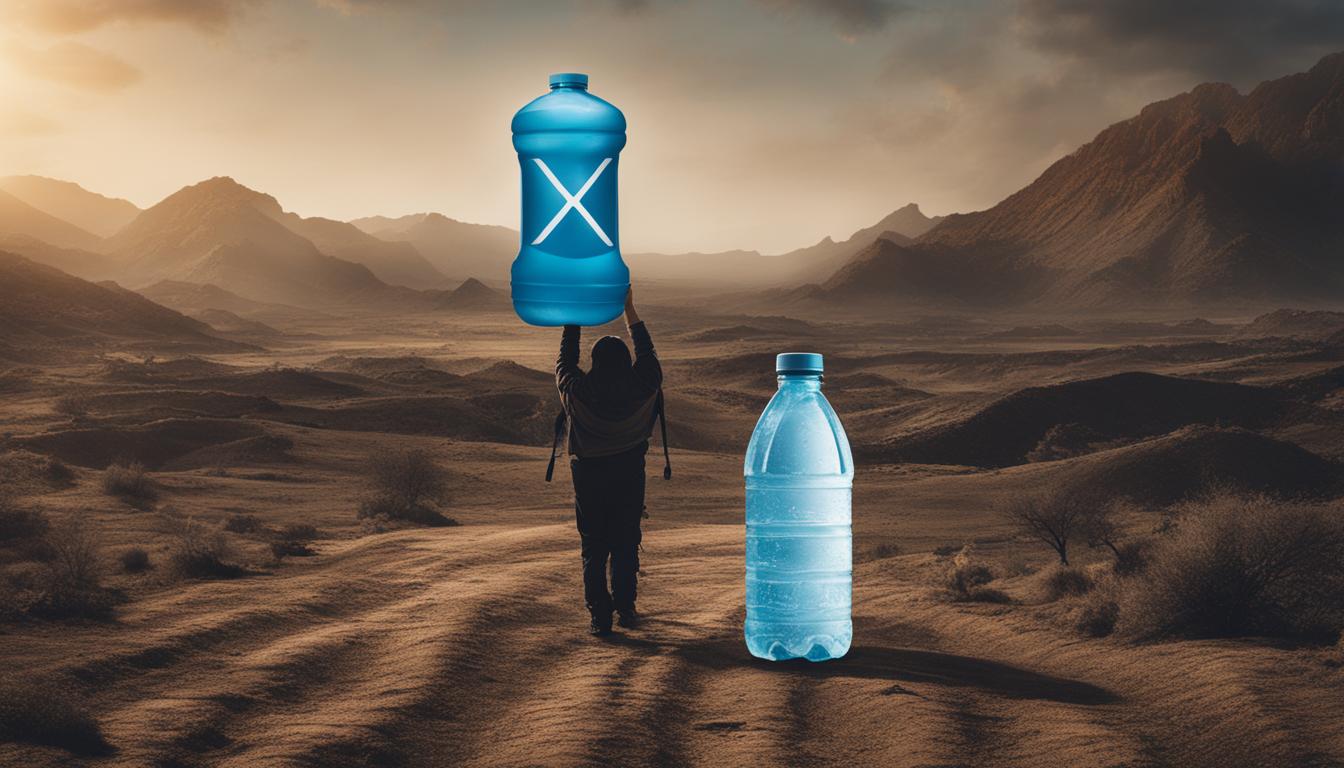Staying properly hydrated is crucial for maximizing your workout results. Hydration plays a vital role in exercise performance and recovery. It helps regulate body temperature, lubricate joints, transport nutrients, and provide energy. Lack of hydration can lead to fatigue, muscle cramps, dizziness, and other symptoms that hinder your workout. It is important to understand the connection between hydration and exercise to ensure optimal results.
Key Takeaways:
- Staying hydrated is essential for optimizing your fitness routine.
- Hydration enhances exercise performance, improves recovery, and prevents injuries.
- Water is the most suitable fluid for staying hydrated during workouts.
- Proper hydration aids in weight management and overall health.
- Follow guidelines for water intake and consult healthcare professionals for personalized hydration strategies.
The Benefits of Staying Hydrated During Exercise
Staying hydrated during exercise offers numerous benefits. Not only does it help improve endurance and performance by keeping your muscles energized and preventing weakness, but it also plays a crucial role in preventing injuries. By maintaining the lubrication and health of your joints, proper hydration can reduce the risk of joint-related issues during physical activity.
But the advantages of proper hydration for exercise go beyond physical well-being. Staying hydrated can enhance your resilience to pain, enabling you to push past your limits and achieve more during your workouts. It can also improve your overall exercise experience by promoting comfort and reducing discomfort.
Proper hydration during exercise is like giving your body a boost of endurance and optimizing your performance. It can help you take your fitness goals to the next level.
Additionally, staying hydrated can support weight management efforts. Drinking an adequate amount of water during workouts can help promote satiation, reducing the likelihood of excessive food intake. By maintaining proper hydration, you can support your body’s natural mechanisms for appetite regulation and make healthier choices when it comes to fueling your workouts.
Ensuring you stay properly hydrated throughout your exercise routine is crucial for maximizing the benefits of your workouts and achieving your fitness goals. Next, we will explore how to effectively maintain hydration levels during physical activity.
How to Stay Hydrated When Working Out
To stay hydrated when working out, it is important to prioritize water intake before, during, and after exercise. The American Council on Exercise provides specific guidelines to maintain optimal hydration levels based on different exercise durations.
Before exercising, it is recommended to drink 17 to 20 ounces of water 2 to 3 hours beforehand. This ensures your body is adequately hydrated and prepared for the upcoming physical activity.
During warm-up or within 20 to 30 minutes before starting your workout, drink 8 ounces of water to continue replenishing your fluid levels.
“Hydration is key to maximizing your workout performance and achieving your fitness goals.”
Once you’re in the midst of your exercise routine, it’s crucial to maintain hydration. Drinking 7 to 10 ounces of water every 10 to 20 minutes during physical activity helps to replenish fluids lost through sweat and keeps you hydrated throughout your workout.
After completing your workout, it’s important to continue focusing on hydration. Drink 8 ounces of water no more than 30 minutes after exercise to aid in recovery and rehydrate your body.
Monitoring your urine color can also serve as a simple indicator of your hydration levels. If your urine is light yellow or clear, it indicates proper hydration, whereas dark yellow urine suggests dehydration and prompts the need for increased water intake.

By following these hydration tips for active individuals, you can ensure adequate fluid intake and maintain hydration levels during physical activity. Remember, staying properly hydrated is key to optimizing your workout performance and achieving your fitness goals.
The Connection Between Hydration and Exercise Performance
Proper hydration is essential for optimizing exercise performance. The connection between hydration and exercise performance is undeniable. When you are properly hydrated, it enhances your endurance, strength, and overall exercise capacity.
Dehydration, on the other hand, can significantly impact your performance:
“Dehydration during exercise can lead to decreased performance, fatigue, and impaired cognitive function.”
When your body is dehydrated, it struggles to regulate its temperature, impacting your ability to perform at your best. Dehydration also affects your muscles, making them more prone to fatigue and muscle cramps. Furthermore, impaired cognitive function due to dehydration can hinder your focus and decision-making during exercise.
It is crucial to maintain adequate hydration levels to optimize exercise performance:
“By staying properly hydrated, you can unlock your full potential and achieve your desired fitness goals.”
Whether you’re engaging in high-intensity training or endurance exercises, proper hydration is key to reaching your peak performance. By replenishing your body with fluids, you’ll have the energy and stamina to push through challenging workouts and achieve optimal results.
The visuals above depict the importance of hydration in exercise performance. They serve as a visual reminder of the positive impact that proper hydration can have on your overall fitness journey.
Best Fluids for Staying Hydrated During Workouts
When it comes to staying hydrated during workouts, water is the best fluid for most people. It’s easily accessible, calorie-free, and essential for maintaining proper hydration levels. Drinking water before, during, and after exercise helps replenish lost fluids and keeps you energized throughout your workout.
However, for high-intensity workouts lasting longer than an hour, sports drinks can provide additional benefits. Sports drinks contain electrolytes like sodium and potassium, which help replace those lost through sweat. They also provide carbohydrates for an extra energy boost, helping you stay fueled during prolonged exercise.
It’s important to choose sports drinks wisely. Check the calorie content, added sugar levels, and serving sizes to ensure they align with your fitness goals. Opt for low-calorie or zero-calorie sports drinks to avoid consuming excessive calories. Additionally, be mindful of the added sugar in some sports drinks and opt for ones that have lower sugar content or are sugar-free.
Avoid sugary drinks like juice and soda when it comes to hydration during workouts. These beverages are high in added sugars and can lead to energy crashes and sluggishness, hindering your exercise performance.

Importance of Staying Hydrated for Exercise Recovery
Proper hydration is essential not only during exercise but also for effective recovery. When you engage in physical activity, your muscles undergo stress and require nutrients and oxygen to repair and regenerate. Staying hydrated plays a crucial role in facilitating this recovery process.
Hydration helps deliver essential nutrients to your muscles, promoting their repair and recovery. When you exercise, your body loses fluids through sweat, and replenishing these fluids is essential for maintaining the body’s hydration balance.
By staying hydrated after exercise, you can optimize the recovery of your muscles. It allows your body to replenish the fluids lost during your workout, enabling efficient rehydration.
Proper hydration also aids in flushing out waste products and toxins from your muscles, reducing post-exercise soreness and inflammation. By supporting the elimination of metabolic waste, staying hydrated can help expedite the recovery process and alleviate muscle fatigue.
It is recommended to drink water or hydrating fluids within the first hour following your workout. This timeframe is critical as it allows for the effective replenishment of fluids and nutrients.
Celebrate your achievements, both in fitness and recovery, by prioritizing hydration. Remember, staying hydrated after exercise promotes optimal recovery, supports muscle regeneration, and contributes to overall exercise performance.
“Proper hydration is key to facilitating muscle repair and recovery after exercise.”

Next: Effects of Dehydration During Exercise
Effects of Dehydration During Exercise
Dehydration during exercise can have detrimental effects on your body. When you don’t consume enough fluids to replenish what you lose through sweat, it can lead to various symptoms and complications.
Dizziness and Muscle Cramps: One of the primary effects of dehydration during exercise is dizziness and muscle cramps. Without adequate hydration, your body struggles to maintain electrolyte balance, leading to muscle fatigue and involuntary contractions.
Dry Mouth and Lack of Sweating: Dehydration also causes dry mouth, as your body tries to conserve fluids. Additionally, as you lose water, your body reduces sweating to retain the little fluid it has, increasing the risk of overheating and heat-related illnesses.
Rapid Heartbeat: When dehydrated, your heart has to work harder to pump blood throughout your body, leading to an increased heart rate. This can put additional stress on your cardiovascular system.
Mental Confusion and Weakness: Severe dehydration can result in mental confusion, difficulty focusing, and weakness. Your brain requires adequate hydration to function optimally, and dehydration can impair cognitive performance.
To illustrate the severity of dehydration, consider heat illness, which can occur when your body can’t effectively cool itself during exercise in hot or humid weather. Heat cramps, heat exhaustion, and heatstroke are serious conditions that can have life-threatening consequences if not addressed promptly.
“Dehydration during exercise can have adverse effects on your body’s ability to regulate temperature, potentially leading to heat illness.”
Incorporating proper hydration practices into your exercise routine is crucial to prevent these complications. Keeping your body adequately hydrated before, during, and after exercise can help optimize performance, reduce the risk of injuries, and support overall well-being.

How Much Water Should You Drink During Exercise?
The amount of water you should drink during exercise can vary depending on several factors, including your sweat rate, environmental conditions, exercise intensity, and individual medical conditions. It’s important to find the right balance to stay adequately hydrated and perform at your best.
The American Council on Exercise provides general guidelines for water intake before, during, and after exercise. However, it’s important to note that personalized hydration strategies may be necessary for optimal performance. Athletes, in particular, may benefit from measuring fluid loss during exercise to determine their specific water needs.
By staying properly hydrated, you can help prevent dehydration, which can lead to fatigue, muscle cramps, and other performance limitations. It’s essential to listen to your body’s thirst cues and drink water regularly throughout your workout.
“Proper hydration is crucial for enhancing exercise performance and preventing dehydration-related issues. It’s important to find a hydration routine that works best for you.”
Risks of Overhydration
While proper hydration is essential for overall health and exercise performance, it is equally important to be aware of the risks associated with overhydration. Overhydration occurs when you consume more water than your body needs, and it can have negative consequences on your health.
One of the main risks of overhydration is a condition called hyponatremia. Hyponatremia is characterized by an imbalance of electrolytes in the body, particularly sodium. When you consume excessive amounts of water, it dilutes the concentration of sodium in your blood, leading to hyponatremia.

Hyponatremia can cause various symptoms, including nausea, headache, confusion, seizures, and in severe cases, it can be life-threatening. It is essential to be aware of the signs of hyponatremia and seek medical attention if you experience them.
To avoid the risks of overhydration, it is important to listen to your body’s thirst cues and drink water in moderation. While it is important to stay hydrated during exercise, excessive water intake can be just as harmful as dehydration. It is advisable to consult with a doctor or healthcare professional to determine the appropriate amount of water to drink while exercising based on your individual needs and health conditions.
Remember, staying properly hydrated is about finding the right balance. Hydration is essential for exercise performance and overall health, but knowing how much water is too much can help you avoid potential risks and maintain optimal hydration levels.
The Impact of Hydration on Overall Health
Proper hydration is not only crucial for exercise performance but also for overall health. Water plays a vital role in maintaining bodily functions, transporting essential nutrients, regulating body temperature, and supporting the health of our organs. When we are properly hydrated, our body can function optimally, allowing us to perform at our best in all aspects of life.
Dehydration, on the other hand, can have negative effects on the body’s physiological processes and contribute to various health issues. It can lead to fatigue, headaches, dizziness, and difficulty concentrating. In severe cases, dehydration can even cause kidney problems, urinary tract infections, and digestive issues.
By staying adequately hydrated, we can prevent these health complications and promote overall well-being. Water helps flush out toxins from our body, aids in digestion, and supports a healthy immune system. It also helps maintain the elasticity of our skin, keeping it hydrated and vibrant.

Leading a healthy lifestyle includes prioritizing hydration as an essential part of our daily routine. By drinking enough water throughout the day – approximately 8 cups or 64 ounces for the average adult – we can maintain proper hydration levels and support our overall health.
“Drinking enough water is crucial for our body’s optimal functioning. Staying hydrated promotes overall well-being and helps prevent various health issues.” – Dr. Emily Johnson, MD
Remember, our bodies are composed primarily of water, and every cell depends on it for proper function. Don’t underestimate the importance of staying hydrated for your overall health. Make hydration a priority and reap the benefits of a healthy, well-hydrated body.
Conclusion
Maintaining proper hydration is key to optimizing your fitness routine. By staying hydrated, you can enhance exercise performance, improve recovery, prevent injuries, and promote overall health. Dehydration can negatively impact your workout, causing fatigue, muscle cramps, and decreased cognitive function.
It is important to follow guidelines for water intake during exercise, listening to your body’s thirst cues and incorporating regular water breaks into your workout. Consulting with healthcare professionals or registered dietitians can provide personalized hydration strategies tailored to your specific needs.
While water is the most suitable fluid for hydration, sports drinks may be beneficial for high-intensity, prolonged exercise as they provide additional energy and electrolytes. However, it is crucial to choose wisely, considering the calorie content, added sugars, and portion sizes of these drinks.
Prioritizing hydration in your exercise routine is essential for maximizing the benefits of your workouts. By taking care of your body’s hydration needs, you can optimize your performance, improve your recovery, and achieve your fitness goals more effectively. Remember, drink up and sweat it out!
FAQ
Why is hydration important in a fitness routine?
Staying properly hydrated is crucial for maximizing your workout results. Hydration plays a vital role in exercise performance and recovery. It helps regulate body temperature, lubricate joints, transport nutrients, and provide energy.
What are the benefits of staying hydrated during exercise?
Staying hydrated during exercise offers several benefits. It improves endurance and performance by keeping your muscles energized and preventing muscle weakness. Adequate hydration also helps in preventing injuries by maintaining the lubrication and health of your joints. Moreover, staying hydrated enhances your resilience to pain and can improve your overall exercise experience. Additionally, proper hydration can aid in weight management by promoting satiation and reducing excessive food intake.
How can I stay hydrated when working out?
To stay hydrated when working out, it is important to consume water before, during, and after exercise. The American Council on Exercise suggests specific guidelines for water intake based on different exercise durations. It is recommended to drink 17 to 20 ounces of water 2 to 3 hours before exercising, 8 ounces of water 20 to 30 minutes before or during warm-up, and 7 to 10 ounces of water every 10 to 20 minutes during exercise. Additionally, it is important to drink 8 ounces of water no more than 30 minutes after exercise. Monitoring your urine color can also be an indicator of hydration levels.
What is the connection between hydration and exercise performance?
Hydration plays a crucial role in exercise performance. Proper hydration enhances endurance, strength, and overall exercise capacity. Dehydration can lead to decreased performance, fatigue, and impaired cognitive function. It is important to maintain adequate hydration levels to optimize exercise performance and achieve desired fitness goals.
What are the best fluids for staying hydrated during workouts?
Water is the most suitable fluid for staying hydrated during workouts for most people. However, for high-intensity exercise lasting longer than an hour, sports drinks may be beneficial as they provide additional energy and electrolytes. It is important to choose sports drinks wisely, considering their calorie content, added sugar levels, and serving sizes. Avoid sugary drinks like juice and soda, as they are not healthy options for hydration during workouts.
Why is staying hydrated important for exercise recovery?
Hydration is equally important for exercise recovery. Proper hydration facilitates the delivery of nutrients and oxygen to muscles, aiding in their repair and recovery. It helps replenish fluids lost during exercise and restores the body’s hydration balance. Staying hydrated after exercise is crucial for optimal recovery and muscle regeneration.
What are the effects of dehydration during exercise?
Dehydration during exercise can have adverse effects on the body. It can lead to dizziness, muscle cramps, dry mouth, lack of sweating, and rapid heartbeat. Severe dehydration can result in mental confusion, weakness, and even loss of consciousness. Heat illness, such as heat cramps, heat exhaustion, and heatstroke, can occur when the body is dehydrated and unable to cool itself effectively during exercise in hot or humid weather. It is essential to address dehydration promptly to prevent these complications.
How much water should I drink during exercise?
The amount of water to drink during exercise varies for each individual and depends on factors such as sweat rate, environmental conditions, exercise intensity, and individual medical conditions. The American Council on Exercise suggests guidelines for water intake before, during, and after exercise, but personalized hydration strategies may be necessary. Athletes may consider measuring fluid loss during exercise to determine the appropriate amount of water to drink.
How much water is too much?
While proper hydration is essential, it is also important to avoid overhydration. Overhydration occurs when you consume more water than your body needs. This can lead to a condition called hyponatremia, characterized by an electrolyte imbalance. It is important to talk to a doctor or healthcare professional to determine the right amount of water to drink while exercising and to understand the risks of overhydration.
What is the impact of hydration on overall health?
Proper hydration is not only crucial for exercise performance but also for overall health. Water is essential for maintaining bodily functions, transporting nutrients, regulating body temperature, and supporting organ health. Dehydration can have negative effects on the body’s physiological processes and contribute to various health issues. Regular, adequate hydration is necessary for optimal overall health.
Conclusion
Maintaining proper hydration is key to optimizing your fitness routine. By staying hydrated, you can enhance exercise performance, improve recovery, prevent injuries, and promote overall health. It is important to follow guidelines for water intake during exercise, listen to your body’s thirst cues, and seek advice from healthcare professionals for personalized hydration strategies. Remember that water is the most suitable fluid for hydration, but sports drinks may be beneficial for high-intensity, prolonged exercise. Prioritize hydration to maximize the benefits of your exercise routine.


